Award recipients expand Brown’s global reach and will contribute to the institution’s mission of discovering, communicating, and preserving knowledge. A few of this year’s recipients share more about their research experiences and travel.
Henrique Pita Barros
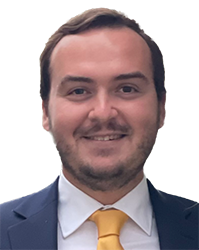 Program: Economics
Program: Economics
Travel Location: Cabo Delgado, Mozambique
About Henrique’s Research: I am conducting a randomized intervention in the city of Pemba, the capital of Mozambique’s province of Cabo Delgado. Since 2017, this region has been affected by a religious extremist insurgency that has already led to more than one million displaced persons, most of them relocated in the city of Pemba. My project develops an intervention which aims to improve the social integration of displaced people with the local hosting community in the city of Pemba.
Kate Creasey
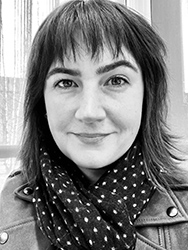 Program: History
Program: History
Travel location: Istanbul, Turkey
About Kate’s Research: Turkey often appears as a “Little America” in the historiography of the Middle East and is portrayed as a sympathetic ally to the United States and NATO. Yet, this narrative eclipses the ruthless violence that decimated the country in the aftermath of the 12 September Coup of 1980. Counter to prevailing narratives, Turkey was an important front for U.S.-backed anti-left counterinsurgency during the late Cold War. From 1980 to 1983, the military junta crushed those who opposed placement of American nuclear missiles on Turkish soil, austerity measures that were meant to make Turkey ‘safe’ for foreign investment, and organizations- particularly around women’s issues and the Kurdish question- that sought to make Turkey a more pluralistic and egalitarian society.
At the time, people in Turkey who faced persecution by the military dictatorship, like members of the Turkish Peace Association, persuasively articulated similarities between their plight and the struggles of leftists in South America under the US-backed dictatorships of Chile and Argentina. Even international human rights organizations, like Amnesty International, drew parallels in their campaigns on behalf of political prisoners between Pinochet’s regime and the generals' rule in Turkey. Yet today these similarities are largely forgotten both within Turkey and in broader narratives of the global late Cold War.
How these similarities and the violence of this period of Turkish history fell out of our narratives (of the global late Cold War) is a central question my dissertation research engages. Istanbul is an important place to conduct research for this project because it is where many non-state archives for this period are located. Many people from this period with whom I will conduct oral history interviews also reside in Istanbul.
Given how the COVID-19 pandemic affected my cohort, I thought for a while I would not be able to spend time in Turkey while working on this dissertation project. I am excited that I get to spend a semester in Istanbul doing research and grateful the Global Mobility Fellowship has facilitated this international travel.
Katie Duarte
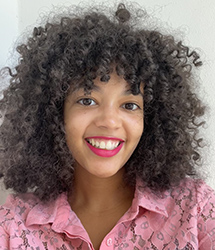 Program: Sociology
Program: Sociology
Travel Location: Santo Domingo, Dominican Republic
About Katie’s Research: Dominican identity has historically relied on a rhetoric of claiming Hispanic culture for its simultaneous proximity to whiteness and distance from Blackness. For Dominicans, a majority Black-descendant Latinx group, this translates to a laborious and expensive ritual of hair straightening. However, a cultural shift is occurring where curly hair and natural hairstyles associated with Blackness are becoming popular among Dominicans in the Dominican Republic and the U.S. This transnational project uses the changing norms of hair as a cultural tool to explore how Dominicans maintain and (re)interpret racial boundaries and identities.
Through interviews with Dominicans in New York City and Santo Domingo about their personal histories of hair, this project studies how Dominicans negotiate their Black and Latinx racial identities and reinterpret hierarchies of race. Conjointly with observations of natural hair salons and analysis of curly hair social media content, it explores how physical and digital locations may serve as spaces to (re)define the presentation of the racialized self. The project will make empirical contributions to cultural sociology, continue to push public debate about the respectability of hair, and hopefully contribute to policy and legal measures that protect against race-based hair discrimination.
Alejandra Cueto Piazza
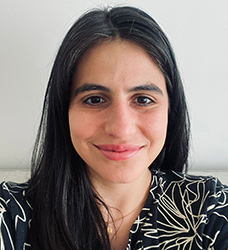 Program: Sociology
Program: Sociology
Travel location: Buenos Aires, Argentina
About Alejandra’s Research: I am currently conducting qualitative research in Buenos Aires studying the implementation of public policies and their effects on informal workers’ access to state resources. I conduct open-ended interviews with different actors such as public officers, social movements’ leaders, and members of the popular economy.
In developing economies, the so-called informal sector represents 70% of total employment. Workers in the informal sector lack access to social protections and face difficulties in organizing collectively for their rights. Argentina presents an important exception to this pattern, where informal workers have successfully built a massive social movement to organize the informal labor force in the country. One of the main goals and achievements of the movement was to reframe their work as “popular economy,” a bottom-up category that emerged from activists who did not fit within conventional understandings of informal economy or unemployment.
Throughout my stay in Buenos Aires, I hope to learn more about Argentineans’ history, its political dynamics, and its bureaucracy. Specifically, I aim to capture how workers, bureaucrats, and politicians engage in symbolic struggles to negotiate how the state “sees” and “counts” informal workers and how this struggle ultimately affects the implementation of public policies.
Katyayni Seth
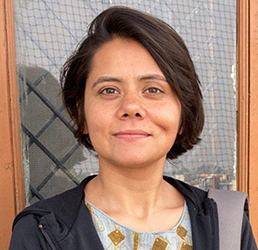 Program: Anthropology
Program: Anthropology
Travel Location: Uttar Pradesh, India
About Katyayni’s Research: Uttar Pradesh (UP) is one of India's poorest states and if it were a country, UP would have the sixteenth highest child mortality rate in the world. In the first phase of my dissertation fieldwork, I examined interactions between families and clinicians in western UP as families sought biomedical care for children suffering from seizures. The second phase of my dissertation fieldwork involves following-up with families to study how medical advice has entered into their daily practices and domestic life. The aim of this research is to understand what happens to biomedicine when it travels from hospitals to homes.
Yunyu Shu
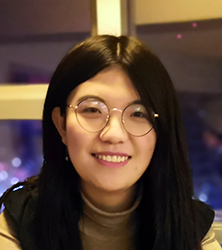 Department: Economics
Department: Economics
Travel location: Ghana
About Yunyu’s Research: My research interests focus on environmental issues in the developing world, in particular on different agents’ adaptation behaviors to climate change and environmental degradation. One project I am currently working on examines cocoa farmers' beliefs and knowledge of climate change, and how they respond differentially to the climate-change-resilient practice of shade management under two incentivized subsidy schemes using experimental data in Ghana.
The Global Mobility Fellowship offers me an opportunity to stay in my research sites in Ghana for months, not only to conduct the fieldwork and collect valuable data for my research, but also to learn more about the local institutional background and cultures, and make better policy implications. All these on-the-ground experiences I gain from the travel are of great value to better bridge my research studies to the real world. I hope my findings from this study could bring local people a better real life in the future.
Pasqual Solass
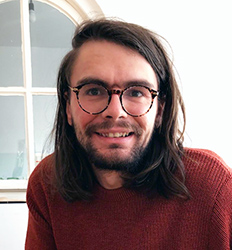 Program: German Studies
Program: German Studies
Travel location: Berlin, Germany
About Pasqual’s Research: I will be visiting the Akademie der Künste in Berlin to review the documents related to Uwe Timm's research on Germany’s colonial history in Namibia for his docu-fictional novel Morenga (1973). As one of the first post-colonial novels written in German, he did extensive archival research and travel to South West Africa (present day Namibia). The novel’s sources range from unpublished diaries, letters, photographs, as well as secondary literature, conversations Timm led, and his correspondence. Timm gifted these items to the Akademie in 2020.
I intend to investigate the political impact Morenga unfolds by examining its various sources as well as Timm’s archival practice of processing and compiling those materials into a highly dense montage oscillating between documentary, scholarly prose and narrative fiction. The goal of investigating Timm’s archival practice would be to conceptualize an archival poetics that affords a complex, polyphonous account of the colonial war avoiding over-simplifying binaries.
My research project is titled: Archival Poetics: Uwe Timm’s Post-Colonial Novel‚ Morenga‘ and the Political Impact of Literature.
Jiayue Zhang
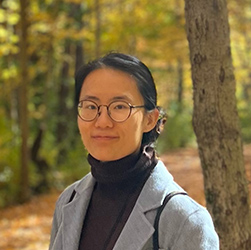 Program: Economics
Program: Economics
Travel location: Nkawkaw, Eastern Region, Ghana
About Jiayue’s Research: My research is on climate change beliefs of smallholder farmers in low-income countries as well as their adaptation decisions in response to policies and information. I chose to study this question in the context of cocoa farmers in Ghana, because they are vulnerable to climate change and have first-hand experiences of climate change impact on their farms. The specific location, Nkawkaw, is selected because it is the largest cocoa production district in the Eastern Region and includes various landscapes and soil types. The heterogeneity in geography offers a rich research environment.